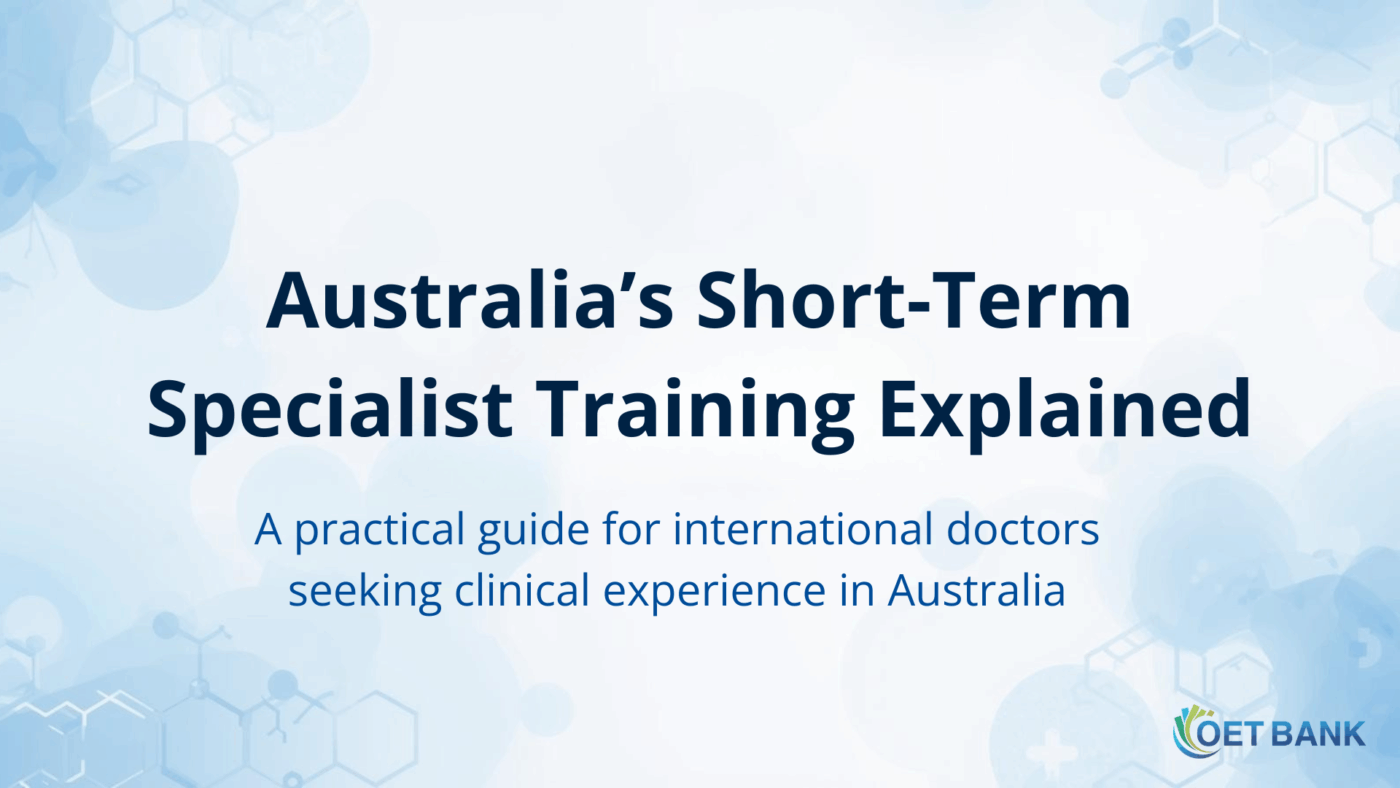Registration & Pathways
Australia’s Short-Term Specialist Training Pathway Explained
Overview
Australia offers a program called “Short-Term Training in a Medical Specialty”, designed for IMGs who wish to gain short-term clinical experience in the country.
Typically, international doctors must pass the AMC exams and complete job applications before working in Australia.
However, those who already hold a specialist qualification overseas can apply through this short-term training pathway to practice in a supervised clinical setting.
In fact, for many foreign-trained specialists considering clinical training in Australia, this pathway is often the most practical route.
Without prior experience in an English-speaking healthcare environment, job placement can be a major obstacle. But by enrolling in this program, specialists can secure clinical positions more easily and gain hands-on experience.
What Is the Short-Term Training Program?
The Short-Term Training in a Medical Specialty pathway allows IMGs to undertake supervised clinical training in Australia for up to 24 months.
Its main purpose is to provide qualified overseas specialists an opportunity to gain experience and training within the Australian healthcare system. However, it also benefits Australia by addressing staffing shortages and rotation gaps in hospitals.
Through this program, IMGs can:
- Gain valuable experience in the Australian healthcare system
- Build professional networks for future employment
- Transition more smoothly toward long-term registration
For hospitals and AHPRA, the program offers a reliable and high-quality solution for filling temporary positions, especially in high-demand specialties such as surgery and internal medicine.
Each doctor is assigned a supervising consultant who provides structured guidance and helps set specific training goals.
Only approved hospitals can host IMGs under this program. The relevant specialist college evaluates hospitals to ensure they meet supervision and training standards before they are allowed to participate.
Eligibility Requirements
To qualify for the program, applicants must meet the following criteria:
- Hold a recognized specialist qualification from their home country
- Provide proof of English proficiency
- Secure a training position at an approved hospital
For English requirements, candidates must achieve IELTS 7.0 or OET 350 (Grade B).
For most IMGs, the OET is often more practical, as it focuses on healthcare communication and clinical scenarios.
For a detailed comparison between IELTS and OET, see this article:
Ref : https://oet-bank.com/oet-b-vs-ielts-7/
Because achieving these English scores can take time, it’s wise to begin preparation early—even before starting the application process.
Finally, you’ll need to secure a hospital placement yourself. The first step is to contact your specialist college and confirm whether it currently accepts applications for the short-term training program.
Advantages and Disadvantages
Advantages
- Training opportunities: Gain hands-on experience in an English-speaking clinical environment, which can significantly ease future overseas employment.
- Reduced cost: Since specialist qualifications are recognized, there are fewer pre-departure requirements beyond English certification.
- AMC exemption: In many cases, specialists can bypass AMC exams if their qualification is approved.
- Paid work: Depending on the department, monthly post-tax salaries can reach around AUD 8,000, especially in surgical fields.
Disadvantages
- Limited placements: Some specialties, particularly minor ones, have fewer available hospitals.
- No direct PR pathway: The program does not lead directly to permanent residency or full registration.
- Obligation to leave: Participants must return to their home country or switch to another visa after completion.
Despite these limitations, the greatest advantage is direct exposure to the Australian healthcare system and the networking opportunities that come with it.
Even though the program itself does not lead to permanent registration, it can serve as a valuable stepping stone toward AMC preparation or Specialist Registration.
How to Apply
Applications are made through the relevant specialist college in your field. You can usually contact them via the “Contact” page on their official website, expressing your interest in the program.
There are two main ways to find a training position:
- Through your specialist college:
Many colleges list open training opportunities on their websites. Search for your field followed by “fellowship,” “inventory,” or “Australia.”
Example: “Orthopaedic Surgery fellowship Australia.” - Through external job sites:
Australia also has state-based job portals for healthcare professionals, such as:
– eRecruit (New South Wales)
– QLD Health Jobs (Queensland)
– Monash Health (Victoria)
If your college doesn’t list available programs, contact them directly. They may provide a list of approved hospitals currently accepting overseas specialists.
Before using external job portals, it’s always best to first negotiate directly with your college for guidance or available placements.
Summary
Here’s a quick recap of the key points:
- The program lasts up to 24 months
- Applicants must have specialist qualifications + English proficiency
- Applications are submitted through specialist colleges
- The biggest challenge is securing a training position
While the pathway doesn’t lead directly to permanent registration, it’s a realistic and structured entry point for IMGs wishing to experience clinical work in Australia.
For many international doctors, the Short-Term Training in a Medical Specialty pathway can be an excellent first step toward building a long-term medical career abroad.
Study with OET BANK
Stop wasting time comparing OET materials.
With OET BANK, you get:
- Premium-quality OET materials, built by professionals
- A focused, efficient study path — no unnecessary content
- A system designed to help you pass OET once — without trial and error
If you want to prepare properly and pass with confidence,
you don’t need to look anywhere else.
Pick your materials and start today — with OET BANK.




